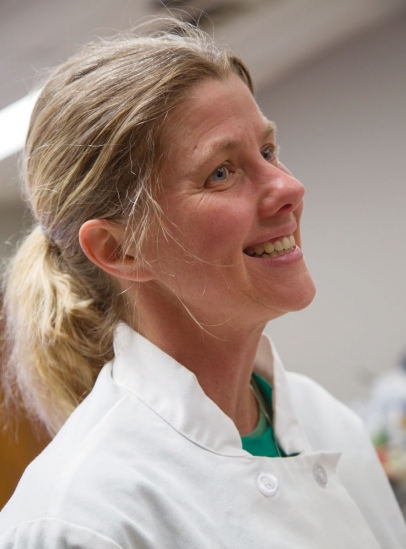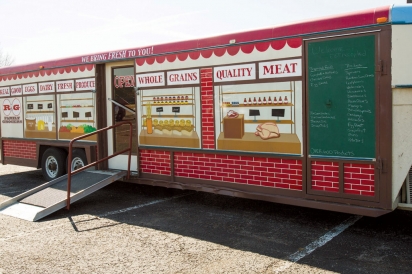Katie Plohocky: Hero Wears No Cape… But Many Hats
Through every issue of Edible Tulsa you have seen that the Tulsa area has so many opportunities to expand your palate and to enjoy the labors of the local food community. But Katie Plohocky is shedding some light on the parts of Tulsa you might not yet know about. She is slowly changing the landscape of food accessibility and health in and around Tulsa.
Whether they have only seen first-hand the effects her good works can do or have been fortunate enough to work side by side with her in one of her many responsibilities, anyone involved with the food community in Tulsa has probably encountered Plohocky. She is one of those people who sees a problem and does everything they can to change it.
“I probably am involved in so many things because they’re all integrated,” said Plohocky. “I feel that you can’t just pick one thing and fix it to fix everything. You have to be involved in all of it.”
And involved she is, because Katie wears lots of hats. Not cowboy hats, ball caps or those silly floppy gardener’s sunhats, but a specific hat that is an advocate for our community, another hat to educate the community, and yet another hat that is slowly but effectively quenching the hunger of a barren food desert.
The Advocacy Hat
As a partner with the Tulsa County Wellness Partnership, Plohocky had the opportunity to speak in front of the City Council to encourage them to pass a Healthy Eating, Active Living Resolution. This resolution initiative deals with the importance of food accessibility, city walkability and employee wellness, just to name a few issues. This involved her and her team meeting with counselors and explaining to them why this initiative is important to the Tulsa community. They provided obesity numbers for kids, discussed diet-related diseases and more, all while explaining how these problems have lead to the necessity of taking these steps towards a healthier city.
“Hopefully this enamors them to look at health in all policies.”
If the resolution passes it would mean that, for example, when the city is deciding to do a zoning update they would consider how it affects health.
She also serves on the Tulsa Food Security Council and through this group she gets the opportunity to speak to different community leaders about the importance of healthy food accessibility and a healthier life.
The Consulting Hat
Through the partnership with the Tulsa County Wellness she is also a consultant for the health department and provides technical assistance on everything food. This allows her the opportunity to cater events at the local and state health department and OSU Tulsa, and bring her healthy eating ideas and food to these groups.
The health department holds a lot of summits and conferences about health outcomes and someone noticed that they would have these breakout sessions about health and then lunch would be this horrible, unhealthy meal. So Plohocky decided they had to fix it. She began donating her time to events, like a Fit To Learn summit last year. At the cost of only the food, she created a beautiful, healthy, all locally grown lunch for everybody in attendance.
“We had a beet salad, a chicken salad and a kale salad, sweet potato salad. It was kind of like all these different salads all with local foods. Very colorful. I believe you eat with your eyes before you eat with your stomach, so presentation is very important.”
Not only does this consulting give her the opportunity to cater food, but also to teach people the importance of the food they are putting in their bodies. Through the consulting she gets the opportunity both to provide meals and to educate the community.
She teaches classes to students at OSU who want to learn how to eat healthy on a budget, offering a cooking demonstration and then a tasting. The meals are all easy things they can throw together, on a budget, without sacrificing their health. She gave a demonstration to graduating medical students on obesity and health concerns and cooked them lunch and even gave a demonstration to an elementary school and discussed childhood obesity.
The Desert Quencher Hat
Of all of the hats Plohocky wears, she talks of this the Healthy Community Store Initiative (HSCI) with the most admiration; after all she is the founder.
Their mission is to provide quality, fresh food to the Oklahoma community through providing access to healthy community stores. Their original plan was to build grocery stores in communities that were considered to be food deserts.
“A food desert is a geographical area where there is little or no access to real groceries,” said Plohocky.
“In an urban area, if you’re more than a mile away from a grocery store you’re in a food desert.”
But after they interviewed a woman who said it was easier to find a gun in her neighborhood than a fresh apple, they knew they could not wait to get those grocery stores up and running. A decision was made to “Take the food to them [the communities] and work backwards.”
So she and her partner, Scott Smith, have converted a nine-horse trailer into essentially a miniature, one-aisle grocery store with refrigerator, freezer, produce and dry goods. The Mobile Grocery Store makes 15 stops every single week to food deserts in and around Tulsa.
“Fresh produce is our niche, because they don’t have access to it,” said Plohocky.
But fresh produce is not the only thing the Mobile Grocery Store is providing because they carry over 600 products. They are also providing prepared foods and samples. Because her customers are on a fixed income, they are typically wary of trying new things, but because she provides samples they can be less circumspect of newer, healthy ingredients. They can buy the prepared food, try samples and even get recipe cards to make it at home.
A lot of these recipes are healthier versions of foods that they might already be used to, like a chicken salad, but instead of mayonnaise, it has Greek yogurt in it to drop 95 calories per serving, plus Plohocky includes grapes and celery, so they are getting more nutritional value out of it. And remember those caterings and consulting hats Katie wears? If any of that food is left over it goes to the mobile truck as well.
That consulting and advocacy hat is also put back on with HCSI. She just met recently with the mayor and community leaders in Sperry to figure out how to bring a grocery store back to their town. They are in the process of trying to establish a community-owned grocery store and have the luxury of using the mobile store to test the waters for the best location.
The Harvester Hat
As if running a mobile grocery store, being a health advocate and consulting were not enough, Plohocky actually harvests the majority of the food for the grocery store as well.
During the summer peak season I go down twice a week and I harvest. I pick all the food, I bring it back and wash all the food and then package all the food,” said Plohocky
She also lets volunteers know she is headed out and takes as many as she can to help her. They learn how to harvest food and she gets the additional help of added hands. An agricultural recovery program is in the works as well. Ideally it will work by busing people down to help harvest the food and in return they will get to take food home, food gets put into the mobile grocery store and anything left over gets donated back to the food bank.
“There’s a lot of food that gets left in the fields and goes uneaten or unharvested because, well, for a lot of reasons, primarily labor, and not having somebody to sell it to,” said Plohocky.
One particular time Plohocky went to get a different crop but while she was at the farm, noticed an entire field of watermelons and she said to the farmer, “Oh my God, this is so cool,” and his response was, “Yeah, I’m plowing this under this weekend.” He didn’t have a buyer for the watermelons and he had to turn the field over. So she went and got a truck and trailer and they harvested everything they could fi t. They then used those watermelons for every event they could in the next few weeks, and she said this kind of thing happens all the time.
“We lost probably 10,000 pounds of watermelons. If we’d had a semi truck we probably could have filled that semi truck up,” said Plohocky.
On another trip she saved about 2,000 pounds of cucumbers and took them straight to the food bank.
With so many hats it would easily be understood if Plohocky developed some strain from all that weight, but with so many organizations in the Tulsa community working towards the greater good why shouldn’t she have her hand in it all?
She said it best when she said, “We’re not competing with each other, we’re all working for the same thing so why don’t we work together?”
For more information about the Tulsa Food Security Council or Healthy Community Store Initiative visit TulsaFoodSecurity.org or TulsaRealGoodFood.com.





